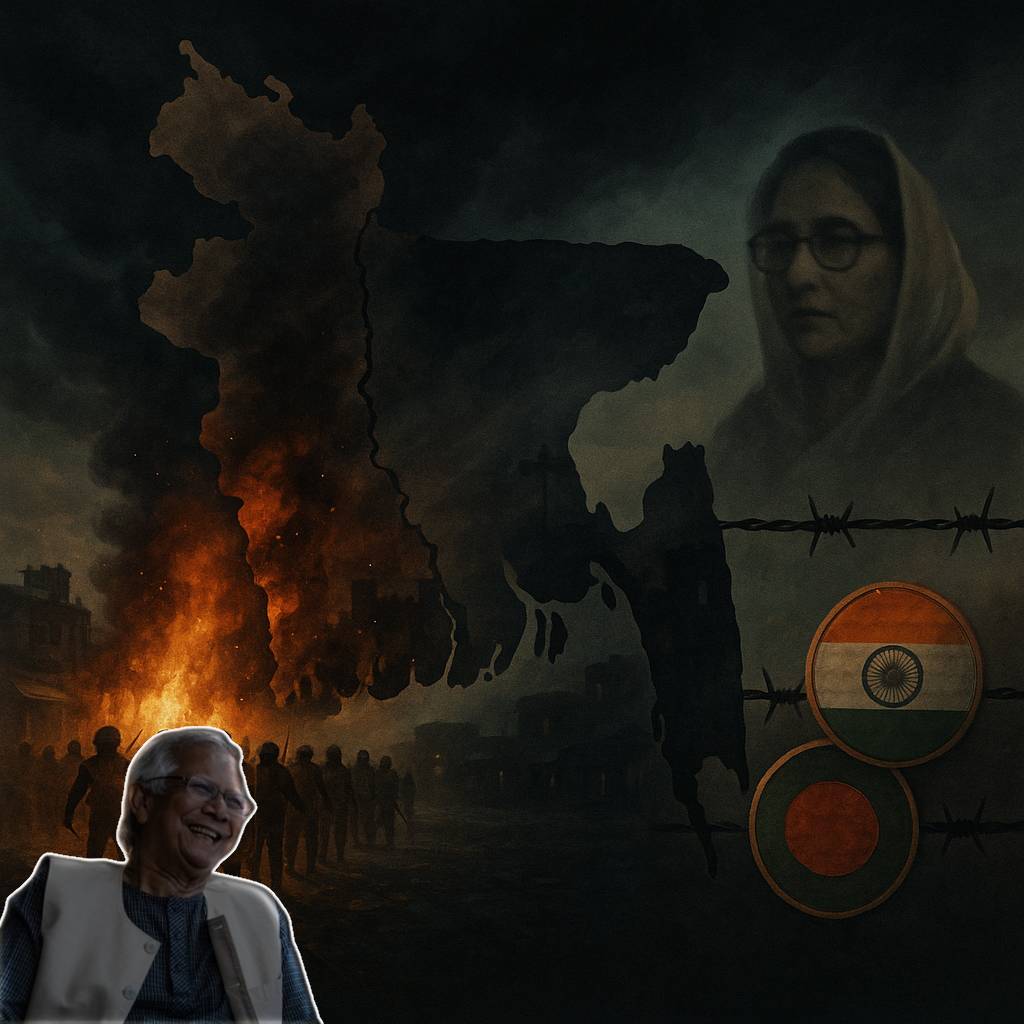
- The verdict against Sheikh Hasina represents a historic and deeply contested turning point for Bangladesh, as the tribunal sentenced her to death in absentia for crimes against humanity tied to the 2024 unrest.
- The legitimacy of the trial is heavily disputed: Hasina, now in exile in New Delhi, rejects the tribunal as politically motivated, while international observers point to procedural flaws including a trial in absentia, limited legal representation, and the broader context of an unelected interim government.
- Bangladesh is enduring severe political unrest—including bombings, lockdowns, a ban on the Awami League, and heightened security measures—reflecting a deepening democratic crisis ahead of the February 2026 elections.
- Relations between India and Bangladesh are under significant strain: Hasina’s presence in India complicates diplomatic calculations, raises potential extradition tensions, and forces New Delhi to balance strategic interests, democratic principles, and regional stability.
India and Bangladesh share deep historical, cultural, and geopolitical ties. Their relationship has been shaped by shared struggles from the 1971 Liberation War to later cooperation over water, trade, and regional security. But today, that relationship is under strain.
On November 17, 2025, the Bangladesh International Crimes Tribunal (ICT) issued a highly disputed judgment that split public opinion, convicting the former Prime Minister Sheikh Hasina for crimes against humanity and sentencing her to death in absentia. In addition, the political turmoil that has arisen as a consequence of the ruling is, in a way, impacting the diplomatic relations and internal peace of two nations, namely, India, where Hasina has settled in exile in New Delhi, and Bangladesh.
This paper attempts to analyse the factors that led to the judgment, the various sides of the verdict, the opinion of the people in Bangladesh, and the impact on India-Bangladesh relations.
Background: Sheikh Hasina’s Fall and the Rise of the Interim Government
Until August 2024, Sheikh Hasina was a dominant figure in Bangladesh politics since the restoration of the democratic system and had been at the helm of her party, the Awami League, without interruption for nearly 15 years. The student-led uprising termed the “July Revolution” emerged through a series of protests that escalated into nationwide unrest against her regime and served as the trigger for her eventual ouster. Many of the protesters deemed Hasina’s government autocratic and levelled accusations of corruption and suppression of dissent.
Yunus’ administration set up a special court under the International Crimes Tribunal of Bangladesh to put Hasina and some of her close supporters on trial for various offences relating to the crackdown against the demonstrations. Ironically, the same tribunal, the ICT, that was responsible for her conviction, was created by Hasina’s government to investigate and prosecute war crimes committed during the country’s 1971 Liberation War.
The Verdict: Charges, Trial, and Sentence
On 17 November 2025, a three-judge panel of the ICT pronounced Hasina guilty on three charges: incitement to violence, ordering killings and Failure to avert atrocities during the 2024 unrest.
The tribunal’s decision stated that Hasina incited violence with her speeches and, more significantly, she was said to have ordered the application of deadly force, through helicopters, drones, and other arms, against the peaceful protesters and the general public. The court concluded that “all the elements constituting crimes against humanity have been fulfilled.” As a single, unified punishment, the tribunal sentenced her to death. Apart from this, she had already been sentenced to six months’ imprisonment in July 2025 on charges of contempt of court, citing a leaked recording where she allegedly exclaimed that she had a “license to kill. 227 people.”
Hasina’s Response: Denial, Delegitimisation, and Political Revenge Charges
From her base in New Delhi, Hasina strongly rejected the verdict. She described the trial as “biased, politically motivated,” conducted by a “rigged tribunal” under an “unelected government with no democratic mandate.” She claimed she was never given a fair opportunity to defend herself, stating that she would face her accusers “in a proper tribunal where evidence can be weighed and tested fairly.”
Hasina, in an interview with India Today, pointed to Yunus and his caretaker government as responsible for her removal from Bangladeshi politics. Hasina adamantly denied all charges, explaining that the violence did not amount to premeditated attacks on civilians and described the tribunal as a “kangaroo court.”
Tensions and Unrest: Political Fallout within Bangladesh
The verdict was not a surprise. For days leading up to the verdict, Bangladesh was in a state of confusion and fear; Dhaka witnessed multiple bomb explosions, the burning of property, and widespread demonstrations. The Awami League declared a nationwide strike in protest against the interim government, accusing it of presiding over the criminalisation of dissent and the dismantling of democratic institutions. The security forces responded forcefully. According to reports, Dhaka Metropolitan Police kept the city under lock and key and issued “shoot-at-sight” orders against any arsonist or attacker. The heightened security highlighted the extent to which the situation in Bangladesh has deteriorated, even as the tribunal’s judgment was broadcast live on state media.
The interim government has invoked the country’s Anti-Terrorism Act to ban Hasina’s political party, the Awami League. This prohibition significantly undermines her political base as Bangladesh advances towards the elections scheduled for February 2026.
Legitimacy Questions: Due Process or Political Justice?
The verdict has been perceived as a way of getting justice by the families of victims in Bangladesh, especially those of the victims, while some international observers have raised serious doubts regarding the process’s fairness and legitimacy.
Sheikh Hasina’s trial has drawn significant scrutiny due to multiple procedural and political concerns. She was tried in absentia, as she resides in India and does not recognise the tribunal’s authority. Reports suggest that she did not appoint her own legal team and was instead represented by a lawyer assigned by the state. Critics argue that the tribunal appeared more political than judicial, viewing it as a means for the Yunus government to sideline a major rival, an allegation reinforced by Hasina’s own characterisation of the prosecution as “vengeful.” Legally, she is entitled to appeal under the ICT Act of 1973 directly to the Appellate Division of the Supreme Court of Bangladesh, but the process requires her arrest or voluntary surrender within 30 days, posing a significant practical barrier. Additionally, a political dimension remains open through the possibility that the President of Bangladesh could theoretically commute her sentence.
Implications for India-Bangladesh Relations
The judgment has enormous ramifications for India–Bangladesh relations in strategic, political, and regional spheres. Hasina’s presence in India has already emerged as a major hotspot, with Dhaka expected to increase the heat on New Delhi for her extradition, an issue muddled by her protected status in India and the severity of her death sentence that further clouds the legal and diplomatic equations. If India rejects the extradition demands, Bangladesh could portray this as an act of hostility, bringing treaty obligations and public opinion to bear on India to exert pressure.
At the regional level, Bangladesh’s internal turmoil creates wider security concerns; prolonged instability could disrupt migration flows, trade, and bilateral security cooperation while possibly pushing Dhaka to seek support from other global powers or even triggering border frictions, developments that India would consider serious security risks. On the political front, New Delhi faces a moral and strategic conundrum: given its long-standing backing of Hasina, it now has to place its strategic interests in balance with the optics of seeming to endorse or join hands against a controversial judicial verdict, including the public positioning, if at all, condemnation of the verdict, neutrality, or joining hands with the interim government. The forthcoming February 2026 elections further complicate matters, for the verdict deepens the delegitimisation of the Awami League following its ban; a boycott or protest of the polls by the party might force India to choose between recognising the electoral process or advocating for democratic inclusion.
Overall, the crisis will be closely watched in India by civil society, the media, and policymakers, shaping perceptions of India’s commitment to democratic values. Questions over the fairness of the trial may also draw international human rights scrutiny, pulling India into a narrative where it may be seen either as Hasina’s protector or as a mediator in a politically charged regional crisis.
Analysis and Reflection
The Hasina verdict sits at the intersection of justice, political rivalry, and democratic fragility, giving rise to multiple interpretations. For victims of past protests and their families, the ruling may be seen as long-awaited accountability, an assertion that even those who wield significant power are not immune to the law if they indeed ordered lethal force. Yet many observers argue that the decision reflects political revenge more than justice, pointing to an unelected interim government that appears to be consolidating its authority by using the tribunal to eliminate a major rival ahead of elections. The trial also sets a precarious precedent: prosecuting a former prime minister for serious crimes could embolden future governments to weaponise the judiciary against political opponents, weakening rather than strengthening democratic norms.
Regardless of intent, the ruling is likely to deepen Bangladesh’s political divisions; a substantial portion of the population is expected to perceive it as the triumph of the victors rather than a step toward genuine reconciliation, thereby fueling long-term instability instead of closure. In this complex environment, India’s diplomatic role will be tested as it seeks to support democratic processes in Bangladesh without alienating Dhaka, all while safeguarding its own strategic interests.
Bangladesh and India: What Future Lies Ahead?
The ruling against Sheikh Hasina on 17 November 2025 is not only a matter of law; it is a historic, perhaps transformative, turning point for Bangladesh. If the accountability claim is true, it is already a serious issue, but at the same time, it raises concerns about political vengeance and authoritarian regulation. The situation is equally serious for India: New Delhi’s reaction, whether through diplomacy, law, or principled engagement, will determine the future of India’s bilateral relations with Dhaka and its position in South Asia. The next few months will be particularly significant as Bangladesh heads into elections. Is the verdict going to result in a more just and stable Bangladesh, or is it going to intensify division and make democratic reconciliation more difficult? Not only the fate of one ruler but also the destiny of a country and its relationship with a strong neighbour rests within the confines of that balance.
References:
- AP News — Bangladesh tribunal sentences Hasina to jail for contempt: https://apnews.com/article/932998f8f88bcc08b7369d665365efc1
- Reuters — Bangladesh bans activities of Hasina’s party: https://www.reuters.com/world/asia-pacific/bangladesh-bans-activities-ousted-pm-hasinas-party-following-protests-2025-05-11/
- Le Monde — Sheikh Hasina tried in absentia: https://www.lemonde.fr/international/article/2025/06/16/au-bangladesh-le-proces-in-absentia-de-sheikh-hasina-l-ex-dirigeante-accusee-de-crimes-contre-l-humanite_6613542_3210.html
- The Guardian — Ousted PM Hasina found guilty: https://www.theguardian.com/world/2025/nov/17/ousted-bangladesh-pm-sheikh-hasina-found-guilty-of-crimes-against-humanity
- India Today — ‘Biased and politically motivated’: https://www.indiatoday.in/world/story/biased-politically-motivated-sheikh-hasina-to-india-today-on-death-sentence-for-crimes-against-humanity-2821179-2025-11-17
- Hindustan Times — Hasina rejects death sentence: https://www.hindustantimes.com/world-news/sheikh-hasina-rejects-death-sentence-by-bangladesh-court-says-not-given-a-fair-chance-101763371362664.html
- India Today — Dhaka blasts, Awami League shutdown: https://www.indiatoday.in/world/story/dhaka-blasts-awami-league-shutdown-sheikh-hasina-tribunal-verdict-glbs-2820904-2025-11-17
- Times of India — Can Hasina appeal the sentence?: https://timesofindia.indiatimes.com/world/south-asia/sheikh-hasina-sentenced-to-death-can-exiled-bangladesh-ex-pm-challenge-the-verdict-what-the-law-says/articleshow/125381349.cms
- Indian Express — Will India be asked for extradition?: https://indianexpress.com/article/world/sheikh-hasina-return-bangladesh-interim-govt-extradition-india-9843457/
- Moneycontrol — Bangladesh on edge after verdict: https://www.moneycontrol.com/world/bangladesh-on-edge-after-sheikh-hasina-s-death-sentence-awami-league-calls-shutdown-protests-expected-top-updates-article-13680946.html
- Al Jazeera — Tribunal convicts ex-PM Hasina: https://www.aljazeera.com/news/2025/11/17/tension-high-as-bangladesh-tribunal-convicts-ex-pm-hasina

Raghvendra Tripathi is an independent researcher with a background in computer applications and a keen interest in technology and geopolitics. His articles focus on how emerging technologies influence international strategy, policy, and global power dynamics. Views expressed are the author’s own.
